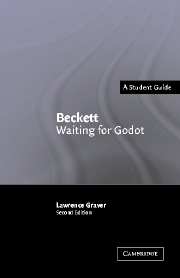1 - En attendant Godot/Waiting for Godot: genesis and reception
Published online by Cambridge University Press: 05 June 2012
Summary
On the night of 5 January 1953, a small but eager audience gathered at the tiny Théâtre de Babylone on the Boulevard Raspail to see a new play by a forty-six-year-old, widely published but little known Irish expatriate then living in Paris and writing in French. A year and a half earlier, Samuel Beckett had created a stir among critics with the powerful, mysteriously evocative novels, Molloy and Malone meurt; the previous February, scenes from the new play, En attendant Godot, had been broadcast on the radio, and a full text appeared in October. Yet despite the anticipation and enthusiasm (and the fact that thirty reviewers were at the dress rehearsal the day before), no one in the audience on that winter night (least of all the author himself) could have thought that this, Beckett's first staged play, would within a few years be performed in hundreds of theatres all over the world and become one of the most widely discussed, influential literary landmarks of the twentieth century.
The story of the genesis and reception of En attendant Godot – of its place in Beckett's development as a writer and its impact on the contemporary theatre – is fascinating yet not easy to relate. The play comes in the middle of the career of a major writer who for half a century moved in a sinuous way through countries, languages and genres (distinguishing himself in all of them), and its extraordinary influence on the way people look at and think about drama is still being felt.
- Type
- Chapter
- Information
- Beckett: Waiting for Godot , pp. 1 - 18Publisher: Cambridge University PressPrint publication year: 2004



